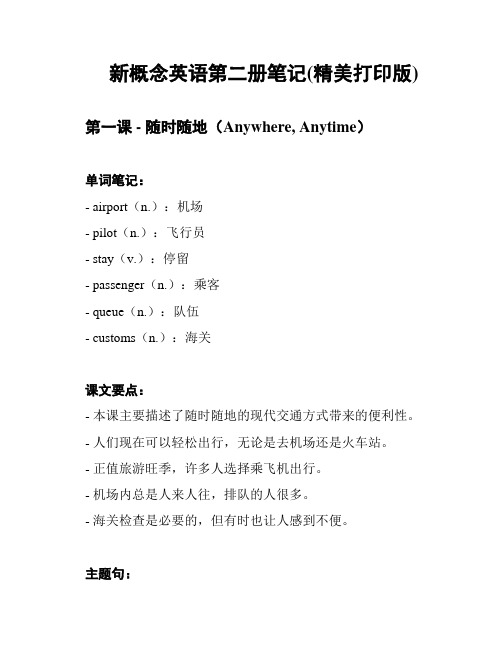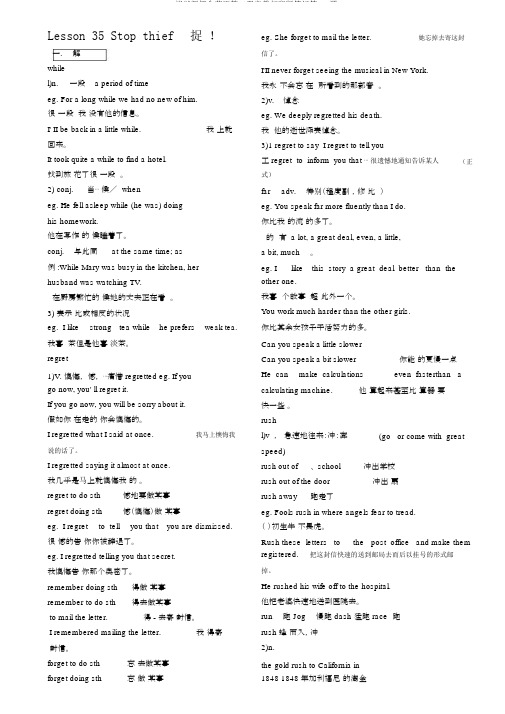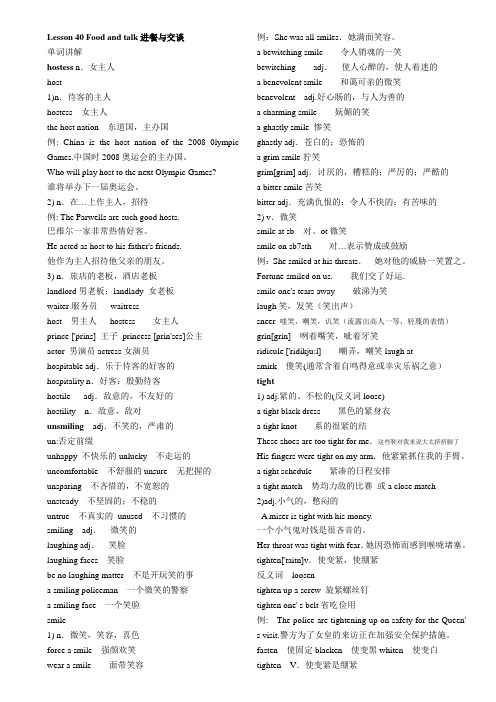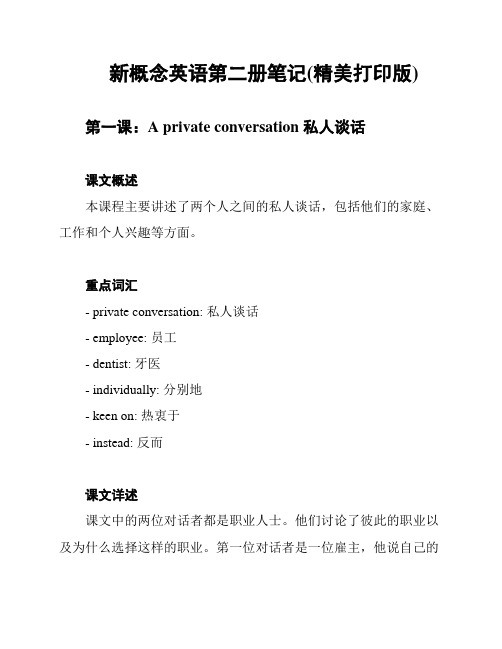裕兴新概念英语第二册笔记打印版本
新概念英语第二册笔记(精美打印版)

新概念英语第二册笔记(精美打印版)第一课 - 随时随地(Anywhere, Anytime)单词笔记:- airport(n.):机场- pilot(n.):飞行员- stay(v.):停留- passenger(n.):乘客- queue(n.):队伍- customs(n.):海关课文要点:- 本课主要描述了随时随地的现代交通方式带来的便利性。
- 人们现在可以轻松出行,无论是去机场还是火车站。
- 正值旅游旺季,许多人选择乘飞机出行。
- 机场内总是人来人往,排队的人很多。
- 海关检查是必要的,但有时也让人感到不便。
主题句:现代交通方式的进步使我们能够随时随地旅行。
语法重点:- 本课中出现了一些现在进行时的句子,如:People are going to airports and railway stations.(人们正前往机场和火车站。
)- 该课还涉及到一些定冠词的用法,如:I like the customs officer.(我喜欢海关工作人员。
)- 其他值得注意的语法点包括人称代词的宾格形式、形容词比较级等。
第二课 - 奇怪的事(Something Strange)单词笔记:- strange(adj.):奇怪的- fly(v.):飞- cloud(n.):云- monster(n.):怪物- little(adj.):小的- eat(v.):吃- bird(n.):鸟课文要点:- 本课主要讲述了一个小男孩和他的奇怪经历。
- 有一天,男孩看到了一只怪物,它是一个身穿红色衣服、长着绿色头发和眼睛的生物。
- 怪物告诉男孩,他不会飞,但是他能飞到云中间。
- 然后,怪物吃了一些小鸟。
- 最后,怪物告诉男孩他会在树上等待,然后就飞走了。
主题句:男孩看到了一个奇怪的怪物,并与它进行了交谈。
语法重点:- 这篇课文中包含了一些过去式的动词,如:He ate five small birds.(他吃了五只小鸟。
裕兴新概念英语第二册笔记打印版_第15课

Lesson 15 Good news1、secretary ['sekrətəri] n.秘书secret ['si:krit] n. 秘密tell a secret 告诉一个秘密keep a secret 保守秘密the secret of success 成功的秘密an open secret 一个公开的秘密in secret 秘密地secret adj. 秘密地,保密的,不公开的a secret marriage 一次秘密的婚礼secretary n. 秘书,书记a private secretary 一位私人秘书Secretary-general 秘书长Secretary of State 国务卿(国家的秘书长)secretive ['si:krɪtɪv, sɪ'kri:tɪv] adj. 喜欢保守秘密的,守口如瓶的eg. He is rather secretive about his personal problems. 他对自己的个人问题守口如瓶。
2、nervous adj. 紧张的nerve n. 神经worried adj. 焦急的,焦虑的(为以后的事情)anxious: very worried eager a. 热切的,盼望的,急切的(褒)annoyed adj. 稍微恼怒的,不悦的angry adj. 生气的irritable ['ɪrɪtəbəl] adj.易怒的, 急躁的nervous breakdown 神经衰弱(口)be nervous about or: be nervous of 对…感到紧张3、afford v. 负担得起(金钱,时间)常与can/could/be able to连用,不用被动语态(no passive)。
afford money 有足够的钱花afford time 能抽出时间afford sth 供给某事物,给予某事物afford to pay money 付得起afford to buy sth,买得起eg. They took a bus because they couldn't afford to take a taxi. 他们因为打不起车而乘公交车。
裕兴新概念英语第二册完美打印版笔记_第28课

Lesson 28 No parking 禁止停车rare1) adj. 稀有的,罕见的,不寻常的(rarer, rarest ) not often happening or seen, unusual eg. He is a rare person. 他是个少见的人。
a rare book 珍本 a rare plant 珍稀植物 a rare butterfly 一只罕见的蝴蝶 a rare visitor 稀客 a rare edition 珍藏本 It is rare + for (sb) + to do sth 某人很少做某事 eg. It is rare for him to be absent. 他很少缺席。
2) adj. (气体等)稀薄的,稀疏的 thin the rare air of the mountains 山里的稀薄空气 3)adj. 半熟的,煮得嫩的I’d like my steak rare, please. 我要的牛排要三、四分熟。
half-done 半熟 well-done 全熟 rarity ['re ər ɪti:] n. [c] 珍品,奇事 [u] 稀有 rareness n. [u] (空气等)稀薄,稀有rarely adv. 不常(否定含义) not often, seldom I rarely eat in restaurants. I often cook myself. 我很少到饭店里吃。
我一般都是自己做。
ancient adj. 古代的,古老的 old adj. 老的,旧的,先前的an old lady 一个老太太an old church 一个古老的教堂 an old friend 老朋友 my old job 我以前的工作 senior ['si:nj ə] adj. 较年长的,资深的junior ['d ʒu:nj ə] adj.年少的, 较年幼的;资历较浅的,地位较低的 senior citizen 老人,退休的人 the senior partner 大股东aged adj. (正式)年老的,体衰的(人) an aged gentleman 一位老人ancient adj. (仅物)远古的,古代的 an ancient civilization 古代文明 an ancient history 古代历史antique [æn'ti:k] adj. (仅物)古旧的,珍贵的 antique furniture 古董家具an antique coin 古钱币myth n. 神话尤指与某一民族早期历史或信仰有关,或解释自然现象的故事。
(完整版)裕兴新概念英语第二册笔记完美打印版

Lesson 1 A private conversation【New words and expressions】★private① adj. 私人的private life 私生活private school 私立学校② adj. 普通的private citizen 普通公民I’m a private citizen. (citizen n. 公民)private soldier 大兵《Private Ryan》《拯救大兵瑞恩》) public adj. 公众的,公开的(private的反义词)public school 公立学校public letter 公开信public place 公共场所privacy n.隐私It’s privacy. 这是我的隐私!(不愿让别人知道的)★conversation n.谈话have a + talk/chat/dialogue/conversation/gossip 名词变动词conversation 一般用于正式文体中, 内容上往往不正式subject of conversation 话题They are having a conversation.talk 内容可正式可不正式, 也可以私人Let’s have a talk.dialogue 对话, 可以指正式国家与国家会谈China and Korea are having a dialogue.chat 闲聊,就是北京人说的“侃”,无关紧要的事。
gossip 嚼舌头, 说长道短★theatre n.剧场, 戏剧cinema n.电影院★seat n.座位have a good seat/place,这里的seat指place(指地点),而不是chair.take a seat/take your seat 坐下来, 就坐Is the seat taken? 这个位置有人吗?请坐的3种说法:Sit down, please. (命令性)Take your seat, please.Be seated, please. (更礼貌)作为动词的seat与sit的区别sit(sat,)vi. 就座He is sitting there.他坐在那儿。
裕兴新概念英语第二册笔记打印版_第21课(完整资料).doc

【最新整理,下载后即可编辑】Lesson 21 Mad or not? 是不是疯了New words and expressions1、mad adj. 发疯的be mad 发疯,发狂(强调状态)go mad 发疯,发狂(强调转变)drive sb mad 逼疯/send sb mad “为……而疯狂(着迷)”的表示方法:be mad about sth 对…疯狂的,狂热的/be mad on sthbe mad on football 对足球狂热 be mad on pop musicbe crazy about… 对…着迷go+adj. 变得……They are going bananas. =go crazy=go mad(变疯了)go mad 发疯,发狂/go crazy/go insane [in'sein]the insane 精神病人go bananas (pl.) become mad or angry, act very foolishly. 发疯,发怒,傻里傻气go nuts 发疯nut: (sl.) foolish, eccentric or mad personmental patient 精神病患者mental hospital 精神病医院like mad 拼命地,猛烈地,疯狂地2、reason1) n. 原因for this reason 由于这个原因for some reason 由于某个原因 ( some: 某一个,加可数名词单数) / for a certain reasongive a reason 提出理由 the root reason 根本原因the reason is that…理由是…the reason why…is that……的理由是…eg. The reason why I study English is that I envy those who speak English well. 我学习英语的理由是我羡慕那些讲英语很好的人。
裕兴新概念英语第二册完美打印版笔记第35课

Lesson 35 Stop thief 捉!一.解whilel)n. 一段 a period of timeeg. For a long while we had no new of him.很一段我没有他的信息。
I' II be back in a little while.我上就回来。
It took quite a while to find a hotel.找到旅花了很一段。
2) conj.当⋯候/wheneg. He fell asleep while (he was) doinghis homework.他在写作的候睡着了。
conj. 与此同at the same time; as例:While Mary was busy in the kitchen, herhusband was watching TV.在厨房繁忙的候她的丈夫正在看。
3)表示比或相反的状况eg. I like strong tea while he prefers weak tea.我喜茶但是他喜淡茶。
regret1)V. 懊悔,憾,⋯痛惜 regretted eg. If yougo now, you' ll regret it.If you go now, you will be sorry about it.假如你在走的你会懊悔的。
I regretted what I said at once.我马上懊悔我说的话了。
I regretted saying it almost at once.我几乎是马上就懊悔我的。
regret to do sth憾地要做某事regret doing sth憾(懊悔)做某事eg. I regret to tell you that you are dismissed.很憾的告你你被辞退了。
eg. I regretted telling you that secret.我懊悔告你那个奥密了。
裕兴新概念英语第二册完美打印版笔记_第40课

Lesson 40 Food and talk进餐与交谈单词讲解hostess n.女主人host1)n.待客的主人hostess 女主人the host nation 东道国,主办国例: China is the host nation of the 2008 0lympic Games.中国时2008奥运会的主办国。
Who will play host to the next Olympic Games?谁将举办下一届奥运会。
2) n.在…上作主人,招待例: The Parwells are such good hosts.巴维尔一家非常热情好客。
He acted as host to his father's friends.他作为主人招待他父亲的朋友。
3) n.旅店的老板,酒店老板landlord男老板;landlady 女老板waiter服务员waitresshost 男主人hostess 女主人prince ['prins] 王子princess [prin'ses]公主actor 男演员actress女演员hospitable adj.乐于待客的好客的hospitality n.好客:殷勤待客hostile adj.敌意的,不友好的hostility n.敌意,敌对unsmiling adj.不笑的,严肃的un:否定前缀unhappy 不快乐的unlucky 不走运的uncomfortable 不舒服的unsure 无把握的unsparing 不吝惜的,不宽恕的unsteady 不坚固的;不稳的untrue 不真实的unused 不习惯的smiling adj.微笑的laughing adj.笑脸laughing faces 笑脸be no laughing matter 不是开玩笑的事a smiling policeman 一个微笑的警察a smiling face 一个笑脸smile1) n.微笑,笑容,喜色force a smile 强颜欢笑wear a smile 面带笑容例:She was all smiles.她满面笑容。
新概念英语第二册笔记(精美打印版)

新概念英语第二册笔记(精美打印版)第一课:A private conversation 私人谈话课文概述本课程主要讲述了两个人之间的私人谈话,包括他们的家庭、工作和个人兴趣等方面。
重点词汇- private conversation: 私人谈话- employee: 员工- dentist: 牙医- individually: 分别地- keen on: 热衷于- instead: 反而课文详述课文中的两位对话者都是职业人士。
他们讨论了彼此的职业以及为什么选择这样的职业。
第一位对话者是一位雇主,他说自己的员工做事不利索,需要手把手地指导。
他所雇佣的人中,有一位牙医,这位牙医个人能力很强,但做事不守规矩。
第二位对话者是一位操控电视卫星的技术员,他对自己的工作很满意。
他认为这份工作能提供稳定的收入,而且他对这个技术很感兴趣。
相比之下,他并不喜欢在办公室工作。
他坚信个人的兴趣和爱好应该引导自己的职业选择,而不仅仅是为了赚钱。
在谈论个人爱好时,两位对话者发现他们都对音乐很感兴趣。
然而,他们的爱好有所不同。
第一位对话者表示,他喜欢个别的音乐会,而不是大型音乐会。
第二位对话者则喜欢大型音乐会,认为那种氛围和观众的热情是独一无二的。
课后练1. 为什么第一位对话者对自己的员工感到不满意?2. 第二位对话者为什么喜欢做电视卫星的技术员?3. 两位对话者的音乐兴趣有何不同?参考答案1. 第一位对话者对自己员工感到不满意是因为他们做事情不利索,需要手把手地指导。
2. 第二位对话者喜欢做电视卫星的技术员是因为这份工作能提供稳定的收入,而且他对这个技术很感兴趣。
3. 两位对话者的音乐兴趣不同。
第一位对话者喜欢个别的音乐会,而第二位对话者喜欢大型音乐会。
- 1、下载文档前请自行甄别文档内容的完整性,平台不提供额外的编辑、内容补充、找答案等附加服务。
- 2、"仅部分预览"的文档,不可在线预览部分如存在完整性等问题,可反馈申请退款(可完整预览的文档不适用该条件!)。
- 3、如文档侵犯您的权益,请联系客服反馈,我们会尽快为您处理(人工客服工作时间:9:00-18:30)。
Lesson 1 A private conversation【New words and expressions】★private① adj. 私人的private life 私生活private school 私立学校② adj. 普通的private citizen 普通公民I’m a private citizen. (citizen n. 公民)private soldier 大兵《Private Ryan》《拯救大兵瑞恩》)public adj. 公众的,公开的(private的反义词)public school 公立学校public letter 公开信public place 公共场所privacy n.隐私It’s privacy. 这是我的隐私!(不愿让别人知道的)★conversation n.谈话have a + talk/chat/dialogue/conversation/gossip 名词变动词conversation 一般用于正式文体中, 内容上往往不正式subject of conversation 话题They are having a conversation.talk 内容可正式可不正式, 也可以私人Let’s have a talk.dialogue 对话, 可以指正式国家与国家会谈China and Korea are having a dialogue.chat 闲聊,就是北京人说的“侃”,无关紧要的事。
gossip 嚼舌头, 说长道短★theatre n.剧场, 戏剧cinema n.电影院★seat n.座位have a good seat/place,这里的seat指place(指地点),而不是chair.take a seat/take your seat 坐下来, 就坐Is the seat taken? 这个位置有人吗?请坐的3种说法:Sit down, please. (命令性)Take your seat, please.Be seated, please. (更礼貌)作为动词的seat与sit的区别sit(sat,)vi. 就座He is sitting there.他坐在那儿。
seat vt.让某人就座Seat yourself.seat sb. 让某人就坐,后面会加人You seat him.你给他找个位置.When all those present(到场者)_D_ he began his lecture.A. sit B. set C. seated D. were seatedsit down 坐下;be seated=take a seat 就坐★angry adj. 生气的★angrily adv. 生气的angry =crossI was angry. /He was cross.annoyed: 恼火的;be blue in the face 脸上突然变色程I was annoyed.度I was angry/cross.加I was very angry.深I am blue in the face. (脸色都青了,相当生气)★attention n. 注意Attention ,please. 请注意(口语)pay attention 注意pay attentio n to … 对……注意You must pay attention to that girl.pay a little attention 稍加注意pay much attention 多加注意pay more attention 更多注意pay no attention 不用注意pay close attention 特别注意★bear(bore, born) v. 容忍① vt. 承受,支撑,承担,负担Can the ice bear my weight?Who will bear the cost? 谁来承担这笔费用?② vt. 忍受(与can/could连用于疑问及否定句中)She eats too fast. I can’t bear to watch/watching her.How can you bear living in this place?bear =stand =put up with I can't bear/stand you.endure:忍受,容忍、put up with :忍受I got divorced(离婚).I could not put up with himbear/stand/endure 忍受的极限在加大bear n.熊white bear 白熊bear hug :热情(热烈)的拥抱give sb. a bear hug★business n. 事, 生意① n. 生意business man :生意人/do business: 做生意go to some place on business:因公出差② n. 某人自己的私人的事情It's my business. (指私人的事, 自己处理的事)It's none of your business. 不关你的事。
★rudely adv. 无礼地, 粗鲁地rude adj.★pay vt. &vi. 支付① vt. &vi. 支付(价款等)You can pay a deposit of thirty pounds… 您可以先付30英镑的定金……I’ll pay by installments.(pay…for sth. 花/支付……(钱)买……)② vt. &vi. 给予(注意等);去(访问)They did not pay any attention.We paid a visit to our teacher last Sunday.③ n. 工资,报酬I have not received my pay yet.【课文讲解】1、Last week I went to the theatre.动词go的原义是离开一个地方去另一个地方,与介词to连用后,常加上主语所要去的目的来代表主语的动作目的。
go to the +地点表示去某地干嘛go to the theatre = go to the theatre to see a play去剧场看戏go to the cinema =see a film去电影院看电影go to the dairy 去牛奶店go to the + 人+ 's 表示去这个人开的店go to the doctor's 去看病;go to the butcher's 买肉以下短语中名词前不加冠词:go to school 去上学;go to church 去做礼拜;go to hospital(医院) 去看病;go to bed 上床,睡觉;go home(跟home相连一定表无事情可做,回家休息)I am at home. 在家休息2、I had a very good seat.seat一般指戏院、汽车等配置的固定座位,也可以抽象地表示“座位”或“位子”等概念。
the front seat of a car 汽车的前座Take a seat, please. 请坐。
3、I did not enjoy it.① enjoy +n. 喜欢,从当中得到一种享受(后面不能跟人I enjoy the music. /the dinner/film/program/game② enjoy oneself/代词玩的开心We always enjoy ourselves.③ enjoy +动名词Jane doesn’t enjoy swimming.4、I got very angry.get在这里有“逐渐变得”的含义,接近become,是个表示过程的动词,表示状态的变化。
而I was very angry则仅表示当时的状态是生气,并不暗示过程。
I am/was angry. 是一个事实、I got angry. 强调变化过程It is hot.、It got hot.got取代be动词,got是半系动词,可直接加形容词。
5、I could not hear the actors. I turned round.hear+人:听见某人的话I could not hear you. Beg your pardon?I couldn't hear you./I couldn't hear a word./I couldn't catch your words.I couldn't hear you clearly./I couldn't catch your words.Beg your pardon? /I couldn't catch your words.turn round =turn around 转身6、In the end, I could not bear it.in the end 最后,终于,表示一段较长的时间之后或某种努力之后She tried hard to finish her homework by herself. In the end, she had to ask her brother for help.7、I can't hear a word!I can't hear a word.美音:肯定I can [] 否定,I can't[],它的/t/是吞进去的, 在读音上很难区别, 只能根据上下文来定hear a word of sb. (a word 等于一句话)He didn't say a word.May I speak to Jim?/May I have a word with Jim?8、It's none of your business.one’s business 指某人(所关心的或份内)的事It's none of your business./None of your business./It's my business. 不关你的事。
It is my business to look after your health.none相当于not any或no one,但语气较强。
She kept none of his letters. none of 这个短语有时可以表达一种断然、甚至粗暴的口气,尤其是在祈使句中:None of your silly remarks! 别说傻话了!【Key structures】简单陈述句的语序陈述句一定是有主语,有动词,有宾语,有句号1 ---主语,一般由名词、代词或名词短语构成,通常位于动词之前,动词必须与主语一致,即主语决定动词的单复数形式2 ---谓语,由动词充当3 ---宾语,一般为名词、代词或名词短语4 ---副词或介词短语,对方式或状态提问,往往做状语I like her very much5 --地点状语,一般在方式副词之后,时间副词之前6 ---时间状语,可以放在句首或句末简单陈述句一定不能少的是主语, 谓语.如果问何时何地,是一个固定搭配when and where[Multiple choice]7 The young man and the young woman paid ___d___ attention to the writer.a. noneb. anyc. not anyd. nonone——代词,没有任何东西、没有任何人None knows./None of us knows.not——否定词,要放在非实义动词后面not any=no He didn't pay attention.no——形容词、修饰名词I don't have any friends./I have no friends.I have no time./I don't have any time.11 The writer could not bear it. He could not ___c___ it.a. carryb. sufferc. standd. liftbear 忍受=standsuffer 遭受,忍受(精神或肉体上)痛苦,suffer后面必须加一种痛苦I suffer the headache.(肉体上的痛苦)He often suffers defeat.(精神上痛苦)Lesson 2 Breakfast or lunch?【New words and expressions】(5)★until prep.直到until用于表示动作、状态等的持续,可译为“一直到……为止”或“在……以前”。
